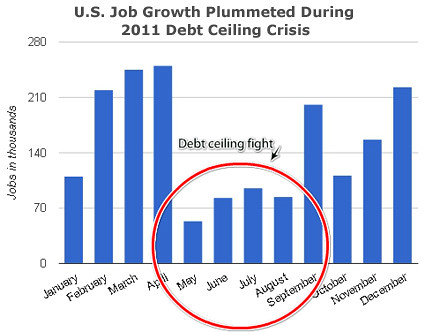Hostage Taker Boehner Accuses Obama of Hostage-Taking on Budget
On the federal budget as with so much else, Republicans won't take yes as an answer from President Obama. On Friday, the White House rolled out its fiscal year 2014 budget proposal cutting projected deficits by $1.8 trillion in part by adopting the means testing of Medicare benefits and the "chained CPI" to slow the growth of Social Security. But while Senate Minority Leader Mitch McConnell had previously declared that "those are the kinds of things that would get Republicans interested in new revenue," House Speaker John Boehner had a different term for it: hostage-taking.
And that's more than a little ironic. After all, the same Congressional Republicans who threatened to destroy the U.S. economy by blocking a previously uncontroversial debt ceiling increase are preparing to do it again.
Of course, you'd never know judging from Boehner's response to the President's budget proposal on Friday. The latest offer of $1.8 trillion in debt reduction over the next decade includes only about $600 billion in new tax revenue. That would come on top of the $2.5 trillion in savings (three-quarters of it spending cuts) already put in place since 2011. Nevertheless, Boehner rejected Obama's concessions out of hand:
"If the president believes these modest entitlement savings are needed to help shore up these programs, there's no reason they should be held hostage for more tax hikes. That's no way to lead and move the country forward."
But even as Speaker Boehner was ruling out any new tax revenue for a federal Treasury which obviously needs it, his GOP lieutenants were busy planning his party's next round of hostage-taking over the debt ceiling. As the National Journal reported Saturday:
While the appetite seems low for a massive showdown like the debt-ceiling fight of the summer of 2011, particularly as the Republican Party does some soul-searching on how to best present itself on fiscal and economic issues, House Republicans have continued their aggressive rhetoric. Extracting "dollar-for-dollar [spending cuts] is the plan," House Speaker John Boehner told reporters just before recess. Huelskamp is quick to say that he and his fellow tea party members want a debt-ceiling compromise to include cuts in funding or major structural changes to Medicare, Medicaid, the Affordable Care Act, and food stamps.
As the Wall Street Journal explained, House Majority Leader Eric Cantor (R-VA) is Boehner's point man for the GOP's upcoming debt ceiling extortion strategy. With Uncle Sam needing to hike the debt limit as soon as May in order to avoid default, Republicans plan to keep up the pressure for draconian spending cuts:
House Republican leaders plan to advance a bill soon that would seek to prioritize Treasury payments in the event the debt ceiling is breached, revisiting a conservative idea that has been handily rejected by Democrats.
The legislation would direct the Treasury to pay holders of U.S. debt and interest on the debt at the expense of funding operations of the federal government if Congress fails to reach an agreement to increase the statutory borrowing limit.
In a memo to rank and file Republican lawmakers, House Majority Leader Eric Cantor (R., Va.) said the House would consider the bill in the near future, ensuring while the need to increase the debt ceiling could be some months off, the issue will remain prominent in Congress.
In the summer of 2011 Republicans brought the nation to the brink of economic calamity when they first took the unprecedented step of threatening block an increase in the nation's borrowing authority. "That standoff ultimately led to a downgrade of the U.S. credit rating," the Journal rightly pointed out, "and continues to impact the ongoing debate on the need to address federal spending."
It's worth noting that even without triggering a default on the full faith and credit of the United States, the Republicans' manufactured debt ceiling crisis two years nevertheless pummeled the American economy. Consumer confidence spiraled down during the summer of 2011, while job creation atrophied until late in the year.
But that economic trough pales in comparison to what would result if the GOP's debt ceiling blackmail is not paid. As Paul Ryan admitted, "You can't not raise the debt ceiling." Two years ago, Speaker Boehner explained why:
"That would be a financial disaster, not only for our country but for the worldwide economy."
South Carolina Republican Senator Lindsey Graham was similarly blunt:
"Let me tell you what's involved if we don't lift the debt ceiling: financial collapse and calamity throughout the world."
Nevertheless, Boehner's party is once again ready to play that dangerous game of chicken in order to extract steep spending cuts certain to return the U.S. to recession. And that, not President Obama's call for new tax revenue to accompany unpopular cuts to Social Security and Medicare, is the definition of hostage-taking. For his part, Mitch McConnell--the same Mitch McConnell who in November said "those are the kinds of things that would get Republicans interested in new revenue"--admitted as much in August 2011:
"I think some of our members may have thought the default issue was a hostage you might take a chance at shooting. Most of us didn't think that. What we did learn is this -- it's a hostage that's worth ransoming."
A hostage that's worth ransoming, Republicans insist, again.


